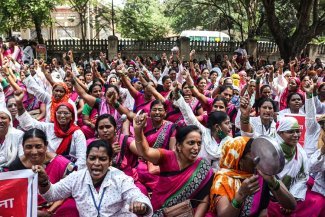The UN High Level Dialogue on Migration and Development which takes place in New York on 3-4 October 2013 represents a real opportunity to change the current course on migration.
Migrant workers around the world need meaningful responses to the rise of trafficking, exploitation, inequality and xenophobia taking place in virtually every country.
A paradigm shift is urgently needed.
The UN must have the courage to challenge the current deregulatory approach to labour migration that puts economic interests before workers’ basic human rights.
Although each country faces specific issues, everywhere migrant workers struggle to get their rights recognized and respected.
Trafficking is on the rise in Europe, many Arab countries sill uphold the Kafala system which places migrant workers at the mercy of their employers, and laws regulating labour migration are yet to be established in several African countries.
Meanwhile, in Asia, millions of migrant workers face severe discrimination, and in Latin America, the progressive laws protecting the rights of migrants are not always enforced.
The latest UN statistics on migration show that South-South migration is as common as South-North migration.
Asians and Latin Americans living outside of their home regions form the largest global diaspora groups while Europe and Asia combined host nearly two-thirds of all international migrants worldwide.
Europe remains the most popular destination region with 72 million international migrants in 2013, compared to 71 million in Asia.
North America experiences the fastest growth in migrant stock by an average of 2.8 per cent per year.
Another striking feature of migration statistics is that half of all international migrants live in 10 countries with the US hosting the largest number (45.8 million), followed by the Russian Federation (11 million), Germany (9.8 million), Saudi Arabia (9.1 million), United Arab Emirates (7.8 million), United Kingdom (7.8 million), France (7.4 million), Canada (7.3 million), Australia (6.5 million), and Spain (6.5 million).
Political courage
Today’s high levels of unemployment must not lead to more abuses of migrant workers’ rights.
The focus must be on decent work for all – migrant and local workers alike.
This is how we will achieve shared prosperity, fairer societies and an end to xenophobia.
Challenging the current paradigm requires political courage.
We feel inspired by the governments that have taken important steps towards developing a rights-based approach to migration. We also feel inspired by the progress made in several countries towards achieving decent work for domestic workers, a great proportion of whom are migrants.
Getting our countries out of the current global crisis requires all of us – governments, international organisations and civil society – to focus on the creation and promotion of decent work for all, to ensure migrant workers enjoy the same wages and working conditions as their local colleagues, to protect their rights to join and organise in unions, and to access justice.
At an intergovernmental level, governments should be encouraged to increase their cooperation with the International Labour Organization (ILO), the only international organisation with a mandate to protect migrant workers.
The High Level Dialogue on Migration and Development must promote the UN legal framework and reaffirm the leadership of the ILO when it comes to labour migration. The world needs a more robust commitment to a gender-sensitive human rights-based approach to migration.
Beyond prejudice
From an institutional perspective, civil society needs a space to discuss in a more coherent and comprehensive way the human rights dimension of migration.
Such space would help us engage in genuine dialogue beyond stereotypes and prejudices, exchange best practices and establish common understanding on issues related to human rights and migration.
The UN must provide that space for dialogue and enhanced cooperation on the human rights and migration nexus, involving all relevant international organisations, states and civil society actors.
The Global Migration Group (GMG) which gathers already all international organisations dealing with migration might appear as an obvious avenue for such a dialogue to take place.
A concrete proposal might therefore be to revisit the mandate of the GMG so as to include a more significant focus on the human rights dimension of migration and to invite states and civil society actors to join some of its meetings.
Realising the rights of migrant workers is not only in the interest of migrants themselves but also of the general population in both countries of origin and destination.
A key challenge for the High Level Dialogue is to find and agree upon an institutional setting at a global level that will enable better protection of migrant rights at a national level. If it fails to do so, abuse, exploitation and xenophobia are likely to continue to spread all around the world.









